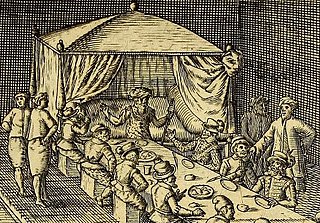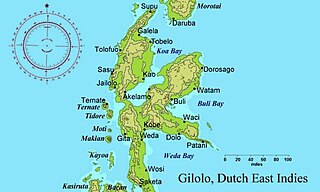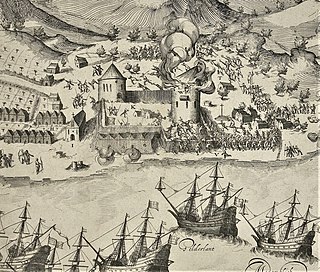
North Maluku is a province of Indonesia. It covers the northern part of the Maluku Islands, bordering the Pacific Ocean to the north, the Halmahera Sea to the east, the Molucca Sea to the west, and the Seram Sea to the south. It shares maritime borders with North Sulawesi, Southeast Sulawesi and Central Sulawesi to the west, Maluku to the south, Southwest Papua to the east, and Palau and the Philippines to the north. The provincial capital is Sofifi, mostly part of the city of Tidore Islands on the largest island of Halmahera, while the largest city is the island city of Ternate. The population of North Maluku was 1,038,087 in the 2010 census, making it one of the least-populous provinces in Indonesia, but by the 2020 Census the population had risen to 1,282,937, and the official estimate as at mid 2023 was 1,328,594.

The Sultanate of Ternate, previously also known as the Kingdom of Gapi is one of the oldest Muslim kingdoms in Indonesia besides the sultanates of Tidore, Jailolo, and Bacan.

The Sultanate of Tidore was a sultanate in Southeast Asia, centered on Tidore in the Maluku Islands. It was also known as Duko, its ruler carrying the title Kië ma-kolano. Tidore was a rival of the Sultanate of Ternate for control of the spice trade and had an important historical role as binding the archipelagic civilizations of Indonesia to the Papuan world. According to extant historical records, in particular the genealogies of the kings of Ternate and Tidore, the inaugural Tidorese king was Sahjati or Muhammad Naqil whose enthronement is dated 1081 in local tradition. However, the accuracy of the tradition that Tidore emerged as a polity as early as the 11th century is considered debatable. Islam was only made the official state religion in the late 15th century through the ninth King of Tidore, Sultan Jamaluddin. He was influenced by the preachings of Syekh Mansur, originally from Arabia. In the 16th and 17th centuries, the Sultans tended to ally with either Spain or Portugal to maintain their political role but were finally drawn into the Dutch sphere of power in 1663. Despite a period of anti-colonial rebellion in 1780–1810, the Dutch grip on the sultanate increased until decolonization in the 1940s. Meanwhile, Tidore's suzerainty over Raja Ampat and western Papua was acknowledged by the colonial state. In modern times, the sultanate has been revived as a cultural institution.

The Sultanate of Bacan was a state in Maluku Islands, present-day Indonesia that arose with the expansion of the spice trade in late medieval times. It mainly consisted of the Bacan Islands but had periodical influence in Ceram and the Raja Ampat Islands. It fell under the colonial influence of Portugal in the 16th century and the Dutch East India Company (VOC) after 1609. Bacan was one of the four kingdoms of Maluku together with Ternate, Tidore and Jailolo, but tended to be overshadowed by Ternate. After the independence of Indonesia in 1949, the governing functions of the sultan were gradually replaced by a modern administrative structure. However, the sultanate has been revived as a cultural entity in present times.
Tabariji or Tabarija was the Sultan of Ternate in Maluku, whose realm also included Makian and other east Indonesian islands. He reigned from 1533 to 1535, when he was deposed by the dominant Portuguese and exiled to India. He later became a convert to Catholicism under the name Dom Manuel.
Zainal Abidin ; born Tidore Wonge or Gapi Buta ) was the 18th or 19th ruler of the Ternate Sultanate of Maluku, located in modern-day Indonesia. His life is only described in sources dating from the 16th century or later. According to these sources he was the first ruler of Ternate to use the title Sultan rather than Kolano, or king, and enacted a number of changes in the government, based on Islamic Law, technically transforming Ternate into an Islamic kingdom.

Sultan Babullah, also known as Sultan Baabullah was the 7th Sultan and 24th ruler of the Sultanate of Ternate in Maluku who ruled between 1570 and 1583. He is known as the greatest Sultan in Ternatan and Moluccan history, who defeated the Portuguese occupants in Ternate and led the Sultanate to a golden peak at the end of the 16th century. Sultan Babullah was commonly known as the Ruler of 72 (Inhabited) Islands in eastern Indonesia, including most of the Maluku Islands, Sangihe and parts of Sulawesi, with influences as far as Solor, East Sumbawa, Mindanao, and the Papuan Islands. His reign inaugurated a period of free trade in the spices and forest products that gave Maluku a significant role in Asian commerce.
Bayan Sirrullah was the second Sultan of Ternate in Maluku. He is also known as Abu Lais or Kaicili Leliatu. He ruled from perhaps 1500 to 1521 and is important as the first east Indonesian ruler who made contact with the encroaching Portuguese.

Sultan Saidi Berkat was the eighth Sultan of Ternate in the Maluku Islands. His capital and seat of power was in the city of Ternate. He succeeded to the extensive east Indonesian realm built up by his father Sultan Babullah, reigning from 1583 to 1606. The Spanish, who colonized the Philippines and had interests in Maluku, repeatedly tried to subdue Ternate, but were unsuccessful in their early attempts. Saidi's reign coincides with the arrival of the Dutch in Maluku, which indirectly caused his deposal and exile through a Spanish invasion.
Sultan Mudafar Syah I, also spelt Muzaffar Syah, was the ninth Sultan of Ternate who ruled from 1606 to 1627. He reigned during an important transitional phase, when the Dutch East India Company gained ascendency in the Maluku Islands and began to regulate the commerce in spices. This was the beginning of the colonial subordination of Maluku that would accelerate during his successors.
Sultan Hamza was the tenth Sultan of Ternate in the Maluku Islands. He ruled from 1627 to 1648, during a time when the Dutch East India Company (VOC) increasingly dominated this part of maritime Southeast Asia, and the increasing power of the Makassar kingdom threatened the Ternatan possessions.
Sultan Mandar Syah was the 11th Sultan of Ternate who reigned from 1648 to 1675. Like his predecessors he was heavily dependent on the Dutch East India Company (VOC), and was forced to comply to Dutch demands to extirpate spice trees in his domains, ensuring Dutch monopoly of the profitable spice trade. During the Great Ambon War in the 1650s, Mandar Syah sided with the VOC but was nevertheless pushed to cede control over areas in Central Maluku. On the other hand, the Ternate-VOC alliance led to a large increase of Ternatan territory in the war with Makassar in 1667.
Marhum, was, according to late tradition, the eighteenth King or Kolano of Ternate in the Maluku Islands. He supposedly ruled between 1465 and 1486, being the first king to adopt Islam. His name merely means "The Late", "The Deceased", and he is probably the same person as King Gapi Baguna II, mentioned in several other chronicles and king lists. His son, Zainal Abidin, became the first Sultan of Ternate.
Ciri Leliatu (Ciriliyati) (Jawi: چلياتي); or Sultan Jamaluddin (سلطان جمال الدين; fl. late 15th/early 16th century) was the first Sultan of Tidore in Maluku Islands, who reigned at a time when Islam made advances in this part of Indonesia because of contacts brought about by the increased trade in spices. He is also sometimes credited with the first Tidorese contacts with the Papuan Islands.

Sultan Muhammad Usman Syah was the 46th ruler of Ternate from 1902 to 1915. He was hostile to the interference in local affairs by the Dutch Colonial State, and was eventually arrested and exiled.
Cico according to historical tradition, was the first king (Kolano) of Ternate in Maluku Islands, Indonesia. His regnal years are given as 1257-1277. Being originally chief of Sampalu village by the coast, he was acknowledged as ruler by the other village leaders in Ternate, starting a dynasty that is still in existence. There are however, several versions of the foundation story, some of which say that Mashur-ma-lamo, son of the Arab immigrant Jafar Sadik, was the first king.

The pre-Islamic rulers of Ternate lorded over the leading spice-producing kingdom in the Maluku Islands in present-day Indonesia. They are known from several partly different historical traditions. One version commences with Cico, a chief of the coastal village Sampalu who obtained a mystical golden mortar and pestle and was elected king (Kolano) by the chiefs of the islands. Other versions start with Mashur-ma-lamo, son of the Arab immigrant Jafar Sadik and a heavenly nymph. Ternate was part of a ritual quadripartition together with the kingdoms of Tidore, Jailolo and Bacan. After many generations, King Tidore Wonge converted to Islam and became Sultan under the name Zainal Abidin (1486?-1500?).

The Sultanate of Jailolo was a premodern state in Maluku, modern Indonesia that emerged with the increasing trade in cloves in the Middle Ages. Also spelt Gilolo, it was one of the four kingdoms of Maluku together with Ternate, Tidore, and Bacan, having its center at a bay on the west side of Halmahera. Jailolo existed as an independent kingdom until 1551 and had separate rulers for periods after that date. A revivalist Raja Jailolo movement made for much social and political unrest in Maluku in the 19th century. In modern times the sultanate has been revived as a symbolic entity.

The Ternatean–Portuguese conflicts were a series of conflicts in the Spice Islands in eastern Indonesia between the Portuguese and their allies on one hand, and the Sultanate of Ternate and its allies, on the other. Hostilities broke out from time to time after the establishment of Portugal in Moluccas in 1522. The strongly Catholic and Muslim identities of the combatants gave the struggle elements of a war of religion, although this aspect was frequently blurred by cross-faith alliances. It was also an economic war since the Portuguese aim was to control export of the profitable trade in cloves. Portuguese-Ternatan rivalry later merged with attempts of expansion by the Spanish in the Philippines. The Portuguese were eventually defeated in 1605 by an alliance between the Dutch East India Company (VOC) and Ternate, ending their active involvement in Moluccas affairs. However, they were soon replaced by the Spanish who maintained an Iberian presence in the region up to 1663.










